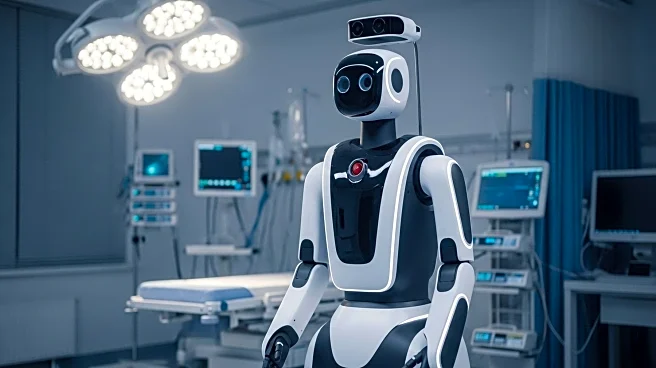What is the story about?
What's Happening?
Healthcare support robots are increasingly being integrated into hospitals and care homes to assist with routine tasks such as patient lifting, medication delivery, room disinfection, and remote consultations. These robots are designed to alleviate the physical demands on healthcare staff, allowing them to focus more on patient interaction and clinical decision-making. The global healthcare robotics market is projected to exceed $15 billion within a decade, driven by innovations in logistics, mobility, and patient support. Major companies like Aethon, Swisslog, and SoftBank Robotics are leading the charge in developing these technologies, which are becoming essential in modern healthcare settings.
Why It's Important?
The deployment of healthcare support robots is crucial in addressing the challenges faced by healthcare systems, including staff shortages and increased patient loads. By automating repetitive and physically demanding tasks, these robots enhance operational efficiency and reduce workplace injuries among healthcare staff. This technological advancement is part of a broader digital transformation in healthcare, integrating robots with cloud systems and electronic health records. The shift towards automation in healthcare not only improves service delivery but also raises ethical considerations about the balance between human interaction and machine assistance in patient care.
What's Next?
As healthcare support robots become more prevalent, the focus will be on scaling adoption while ensuring that human care remains central. Advances in AI and machine vision are expected to make these robots more versatile, capable of handling multiple tasks. The integration of robots into hospital workflows will require careful planning to avoid disruptions in care delivery. Training for healthcare staff to effectively use and trust these systems will be essential. The future of healthcare will likely see a hybrid workforce where robots complement human professionals, enhancing the quality and efficiency of patient care.
Beyond the Headlines
The rise of healthcare support robots prompts discussions on the ethical implications of automation in healthcare. Questions about the extent of patient interaction delegated to machines and the potential reduction of the human element in care are critical. Additionally, the high upfront costs of these technologies pose challenges for hospitals with limited budgets. The long-term impact of robots in healthcare will depend on how well they are integrated into existing systems and the ability to maintain a balance between technological efficiency and compassionate care.















